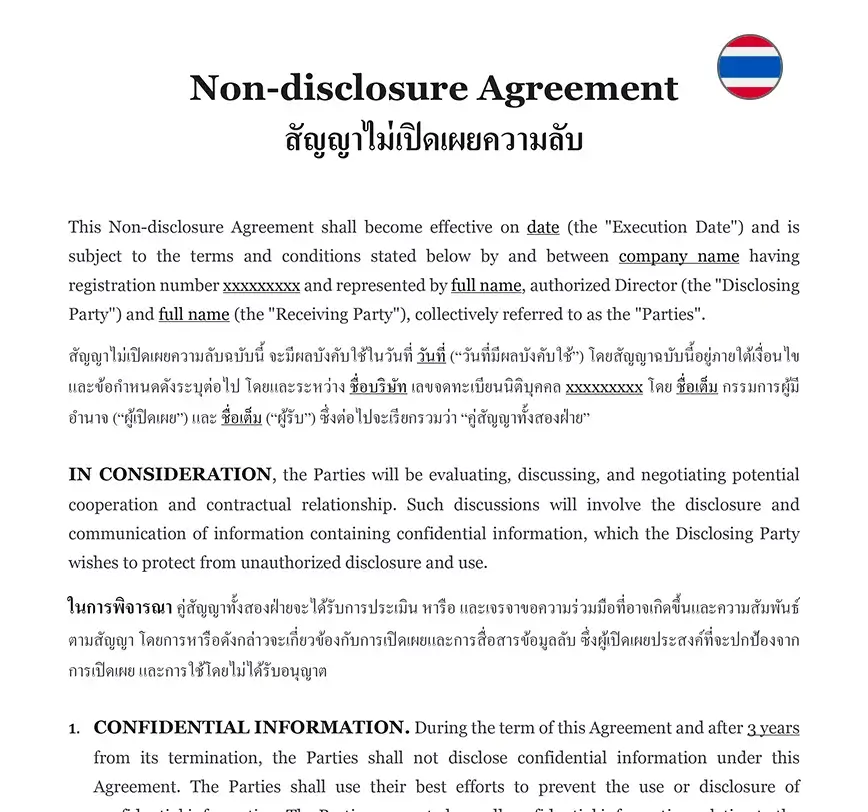Ready to use legal template
Drafted by experienced lawyers
Certified Thai-English translation
Ready to use legal template
Drafted by lawyers
Translated in Thai-English
Home › Business contracts › Non-disclosure agreement (NDA)
Learn more about Non-disclosure Agreement (NDA)
A Non-Disclosure Agreement (NDA) is a legally binding contract that ensures the protection of confidential information shared between parties. It defines the scope of sensitive information, limits its use, and prevents disclosure to third parties without permission. NDAs are crucial in business dealings, whether during negotiations or partnerships to safeguard trade secrets, intellectual property, and proprietary data. In Thailand, an NDA helps businesses comply with local laws governing confidentiality and intellectual property, providing legal protection against breaches. Download our Non-Disclosure Agreement (NDA), expertly drafted in English and Thai, and easy to edit in Word format, for use in Thailand to ensure confidentiality and legal security.
Table of contents
What is a non-disclosure agreement (NDA)?
The non-disclosure agreement is a written document in which the potential buyer undertakes to use the information obtained only in the context of the project to take over the company, not to disclose the information obtained to a third party, not to communicate the information obtained to persons other than the professional who is advising him, not to use the information obtained to harm the company, and to return all the information obtained without keeping any physical or digital copy in the event of failure of the project.
It is also possible to include a commitment not to poach or attempt to poach the company’s employees. This covenant is easily understood because the acquirer, through the personnel information it will have, will know exactly who the key employees of the company are. By signing the non-disclosure agreement, the acquirer generally acknowledges the confidential nature of the information obtained and the fact that the company would be harmed if it did not comply with its confidentiality undertakings.
Why sign a written non-disclosure agreement (NDA)?
In business life, confidentiality can be essential. New technologies, business strategies, financial data, technical innovations, personal information, many items can be sensitive, especially concerning competition. In the context of business relationships, such information must often be disclosed, at least in part, to enable effective negotiation.
Thus, during talks with a partner, an acquirer, or a potential investor, it may be imperative to ensure a contact person’s discretion. Indeed, a company cannot take the risk that a third party with whom it is negotiating might break off talks and reveal sensitive information to the competition or use internal data for its benefit. An action can sanction such behavior for unfair competition, rules of professional ethics specific to a profession, or the various protection regimes offered by intellectual and industrial property law, but this involves sanctioning a posteriori an event that has already produced its adverse effects for the company, and this protection is therefore insufficient.
To protect sensitive data upstream, the most effective practice is to conclude a Non-disclosure Agreement, otherwise known as a confidentiality undertaking, secrecy agreement, or Non-Disclosure Agreement. A non-disclosure agreement (NDA), which can also be concluded between individuals, agrees between two parties to keep specific data secret. When it is unilateral, for example, one party undertakes to the other not to reveal sensitive information that the latter may provide in the case of a Confidentiality Agreement. While the law protects business secrecy in certain specific contexts, the Non-disclosure Agreement in the pre-contractual context remains marked by contractual freedom. The duration of the agreement and the scope of the protected information and the persons concerned are, therefore free in principle, within the limits of abuse.
Who is bound by the NDA?
Only the parties to the contracts are subject to the confidentiality obligation.
In addition, partners should be advised to include a clause that includes an undertaking to ensure that their respective staff and third parties who come into possession of sensitive information comply with confidentiality obligations.
Why download our NDA template?
A non-disclosure agreement, also called a confidentiality agreement, protects against the use of confidential information. However, its effectiveness depends largely on how well it is drafted. Our non-disclosure agreement allows you to protect all information you share with your partner for any type of activity and including any type of information exchanged, whether oral or written. In addition, the following clauses will provide you with legal protection:
Confidential Information: This clause protects you from any information you may pass on to your partner. Thus, a non-exhaustive list has been included in this clause, namely: prospects, customer and supplier information, accounting and financial information, software and data, trade secrets, inventions, business methods, business plans, marketing and sales information, development projects, any other business information.
Non-Disclosure: By this clause, we remind the parties that all information must remain strictly confidential and may only be shared with third parties with the written consent of the parties. In addition, the party receiving the personal data must implement internal data protection procedures to prevent disclosure of such information.
Intellectual Property: This clause serves as a reminder that the person sharing the confidential information retains ownership of that information. This allows for more extensive protection within the confidentiality agreement.
Return of Information: The party sharing the confidential information may request that the other party receiving the information return any confidential information provided in writing or otherwise and delete it if appropriate.
Breach of Contract: Our clause protects the confidentiality of information after the termination or breach of this contract for a specified period of time.
When to sign a non-disclosure agreement?
A non-disclosure agreement can be entered into as part of negotiations or during the performance of a contract when you consider that sensitive information may be disclosed during negotiations and you wish to protect it. However, it is advisable to sign a non-disclosure agreement with your partner or client at the outset of your business relationship to ensure that the other party understands the need to keep the information they receive confidential. Our sample non-disclosure agreement, written by Thai legal professionals, provides you with an editable word template for use in Thailand. This template can be adapted for an individual, a company, an association, or a corporation under foreign law and a unilateral or reciprocal commitment
How to draft a non-disclosure agreement?
Defining the scope of confidentiality
Defining the scope of the confidentiality obligation is a delicate exercise. It is essential to be specific enough without giving away too much information about the nature of the information so as not to allow unscrupulous partners to know what it is before they have even signed the agreement.
Non-disclosure agreement between partners
Some partners agree to keep their negotiations confidential. When several partners have a common research and development plan, this agreement prevents the company’s strategy from becoming known to competitors as a result of one of the partners communicating the quality or nature of the agreement it has signed.
The non-disclosure agreement must specify its duration
The duration of the confidentiality obligation is an essential aspect of a non-disclosure agreement. Without a specific clause on the duration of the agreement, the confidentiality obligation ends with the end of the negotiations. This is an important point because if the negotiations are not successful, both parties are released from their confidentiality obligation without a specific clause. Thus, a creator who has approached a potential partner to create an innovative product could, in fact, have created a competitor before even starting the activity if he has not specified the duration of the agreement.
It is therefore essential to include a clause in the confidentiality agreement providing that the prohibition on disclosure or use of the shared information will survive the burden of the parties in the event that the discussions fail. A sufficiently long but reasonable duration must be defined to secure the project. This duration varies according to the nature of the projects, the economic sector concerned and the interests of the parties.
How do you protect yourself against breach of the NDA?
To reinforce the deterrent effect, the parties may stipulate a penalty clause in the non-disclosure agreement. Such a clause will grant the creditor of the confidentiality obligation, in case of breach by the debtor, a predetermined lump sum as compensation for the damage suffered. This sanction is particularly effective because it is automatic. However, judges have the power to reduce or increase the amount stipulated if it appears derisory or manifestly excessive. From a procedural point of view, in order to validly implement the penalty clause, the creditor must first put the debtor on notice.
SPECIAL OFFER
Startup
15 Document Package
Essential documents for running your business in Thailand
Non-disclosure AgreementTemplate (.docx)
Save on attorney fees
310 client reviews (4.8/5) ⭐⭐⭐⭐⭐
Share information
Why Themis Partner?
Easy legal documents at your fingertips
Make trusted documents for hundreds of purposes.
Hundreds of documents
Instant access to our entire library of documents for Thailand.
24/7 legal support
Quick legal advice from our network of qualified lawyers.
Easily customized
Editable Word documents, unlimited revisions and copies.
No translation fees
Certified Thai-English translation included for all documents.
Legal and Reliable
Documents written by lawyers that you can use with confidence.
Free consultation
Free lawyer consultation on each new matter.




